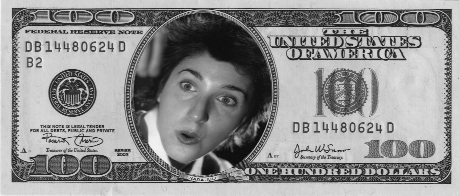Sara Juli goes for broke, literally, in “The Money Conversation”
As Sara Juli waxes hyperactive about personal problems, she cycles through movement phrases, releasing her thoughts through dance. It’s partly planned, partly improvised, and superbly played for maximum comic impact; Juli works the text and audience thoroughly, literally pushing her weight around, testing the limits. Her aesthetic is a fine interplay of words and expressive movement—lunging, looping, aggressive gestures—using repetition, halting verbal variations and rhythms, and the unpredictability of interpersonal improvisation.
Performer, curator, and arts administrator, the talented Juli grew up watching dance as a self-proclaimed “fac-brat” on the campus of Connecticut College where her father is a professor of archaeology. As a youngster, she took classes in the college’s Children’s Dance Center and watched dancers such as Amy Larimer, Holly Handman, and Clare Byrne, with whom she stayed connected over the years. “When I moved to New York, I already had a network,” said Juli.
At Skidmore College, she double majored in dance and anthropology. “I didn’t think dance was a respectable enough major,” she said, and added with tongue in cheek, “although we did learn in anthropology that ‘every culture dances.’” Her extroverted personality, cautious pragmatism, and training in improvisational dance have led her to a life that revolves—vocally—around the art form.
Juli is one of those rare individuals with a brain for the business and the art, and both sides are always on the make. While she cultivates her own solo work, she also continues to curate a dance-theater series at WAX in Williamsburg called “The Bridge,” together with Jake Hooker. Meanwhile she has earned a reputation in development, working first for the American Dance Festival—where she was also a student twice in the young dancers school and three times in the six-week school—and subsequently for Dance Theater Workshop, where she currently works as campaign manager.
Money, interestingly enough, is the issue she is wrestling with now in her life. And in keeping with her artistic tradition, it is the subject of her current show, “The Money Conversation,” during which she will give away her life savings, $5,000, to audience members.
Her first work, “Righteous Indignation” is what she refers to as her “quintessential angry naked dance that everyone must have in their repertory.” “Burden” followed, addressing the complications of being a Jew in love with a non-Jew. “How to Forgive Yourself in Bed” dealt with coming to terms with her past-life of sleeping around. And “Shadow Artist,” which premiered last year at Dixon Place, addressed the fear of being an artist.
“I always call my dances healing dances,” said Juli. “By giving the money away during the performance, I’m facing my fear. It’s a way of purifying.”
“There will also be a mechanism in the show to give the money back,” she added.
What is therapeutic for the artist is usually a laugh riot for the audiences, with whom Juli loves to interact; in addition to giving away money, she’ll be touching and likely laying across laps of attendees.
“The work lives and dies by the audience,” she declared. “I love to play with the tension in the room. In workshop showings for friends, it always bombs. I need those awkward, unscripted moments.”
Juli’s fiancé, non-Jew Chris Ajemian, provided direction on “The Money Conversation,” which is her first full-length show.
“I started doing solo work for convenience reasons,” said Juli. “I was making solos in college, and in my senior year, I did an extremely intensive workshop with Deborah Hay, all day every day for two weeks. I discovered my vocabulary, my deeper way of moving. I discovered my magic. That was really the beginning of this, and it ended up as my niche—the combination of theatrical solo with movement, and the commitment not to use music.”
And humor.
“My prime directive is to make people laugh. Of course, when you play to make people laugh, you always fail. My work takes universal issues, stuff that everyone deals with, and I make fun of myself. It allows people to laugh at me.”
gaycitynews.com


































